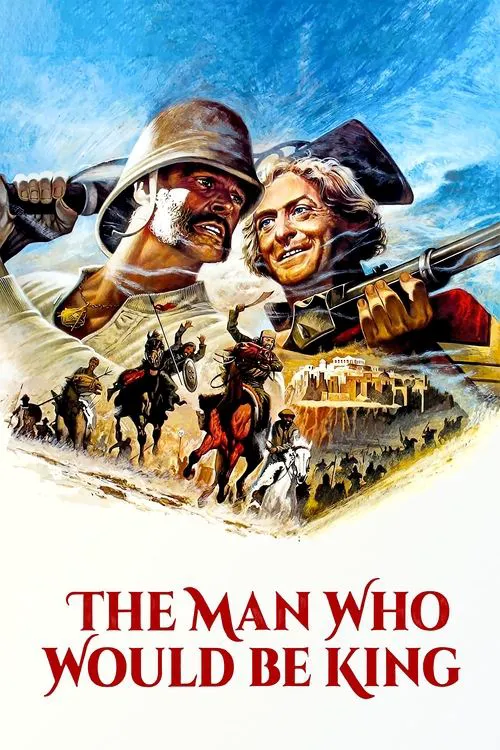The Man Who Would Be King

Plot
In the midst of the 19th century, the vast expanse of colonial India presented ample opportunities for British adventurers seeking fortune and glory. Among the most daring and infamous of these explorers were Daniel Dravot and Peachy Carnehan, two men from Sheffield who had once served in the British Army. Their bond and thirst for experience had forged an unbreakable friendship, and it was this partnership that ultimately led them to their most extraordinary, and ultimately disastrous, adventure. The film adaptation of Kipling's classic short story begins with Daniel Dravot and Peachy Carnehan, both of whom have grown disillusioned with their mundane lives in England. They share a vision of greatness, not merely seeking adventure, but establishing their own kingdom in a remote region known as Kafiristan, where the native inhabitants are simple and primitive. With an air of superiority, the two men, armed with their knowledge of the past and a modicum of experience in the military, set out to conquer this unforgiving land. Arriving in Kafiristan, they begin to gather a small group of local tribesmen who, in awe of their supposed divine origins, willingly surrender to their rule. With an audacity that belies their humble beginnings, Dravot and Carnehan establish themselves as the ruling monarchs, using a convincing blend of myth, bluff, and cunning to solidify their power. They quickly realize that maintaining their authority and keeping the Kafir tribes in line requires an iron fist, and, with their limited but persuasive narrative of a divine origin, they are able to instill a sense of reverence among the native masses. However, their seemingly effortless rise to power and the native population's willingness to accept them as deities sets the stage for a series of tragic events. Carnehan, now fully ensconced in his role as the second in command, begins to harbor a romantic infatuation with a local beauty named Lalah. He becomes infatuated, and the once steadfast bond between him and Dravot starts to fray. Lalah's allure is further intensified by the arrival of a local boy who is said to have an uncanny ability to speak the language of the native people, but who is essentially unimpressed by the pretentious claims put forward by the two adventurers. The native boy, in effect a more honest local leader, has no trouble identifying the pretenders. Their desire for Lalah drives a wedge between Dravot and Carnehan, and the once-unshakeable bond that had sustained them throughout their adventures begins to crumble. As their internal disputes escalate, the external circumstances become increasingly dire. The native boy they had earlier encountered, now a confidant of Lalah's, inadvertently exposes the true nature of Dravot and Carnehan's divine pretensions to the Kafir tribesmen. The resulting rebellion brings about the downfall of their fragile kingdom and ultimately seals their tragic fate. The end of the two adventurers proves a poignant reminder of the perils of imperialism and the hubris that often accompanies men who seek power at the expense of others. Dravot and Carnehan, like many others who have come before and since, ultimately succumb to the consequences of their own actions. The film, adapted from Kipling's short story, presents a searing indictment of imperialism, serving as a nuanced commentary on the dangers of the insatiable human desire for power and the inevitable consequences that arise from such endeavors.
Reviews
Recommendations




